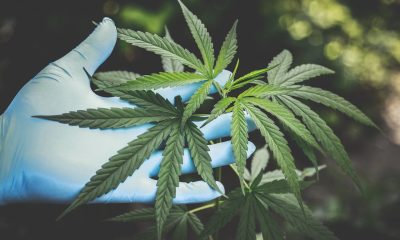Cannabis
Thailand Plans to Reap the Benefits of Cannabis Exports
In February last year, the Southeast Asian country launched an experimental project that allows citizens to grow six cannabis plants per household. The plants can then be sold to the government, which obtains medical cannabis from it. A model that goes beyond government sales or self-production, and that directly involves citizens to expand the market. Thailand plans to focus on cannabis exports.

The cannabis sector in Thailand is performing well, especially the export of cannabis. The government of Thailand has launched a plan to boost exports of hemp and other herbs for medical use. The aim is to increase financial revenues with a consequent benefit for the pockets of farmers, who will have new land available for their crops.
Read more on teh subject and find the latest cannabis news in teh world with the Hemp.im mobile app.
Thailand’s economy to benefit from the cannabis sector
The executive led by General Prayut Chan-o-cha plans to transform 10 thousand rai of land of Sor Por Kor, in the provinces that form the eastern economic corridor, the so-called Cee zone, in plantations that cultivate cannabis, hemp and fah-talai-jone (Andrographis paniculata). The size, if we consider that one rai corresponds to 1,600 square meters, is considerable. The fah-talai-jone, known as green chiretta, is a medicinal herb that is also used to treat diseases caused by Covid, while cannabidiol, or Cbd, is the extract from cannabis that can be applied to treat numerous ailments. Hemp extracts, moreover, can be made into cosmetic ingredients, and the fiber can be used for weaving.
The plant crops were promoted under a memorandum of understanding signed last Tuesday between the Agricultural Land Reform Office and the Eastern Economic Corridor Office. “Thai herbs will become new economic crops for export,” explained Deputy Minister of Agriculture, Thamanat Prompow. Authorities intend to allow Sor Por Kor landowners to plant the three plants to provide raw materials for industries.
The land reform program dates back to 1975, when the then government began allocating plots in degraded forests to landless farmers. The three provinces that make up the Cee zone on the country’s east coast are Chachoengsao, Chon Buri and Rayong. The current executive, on the Cee scheme, intends to establish a high-tech industrial hub. And the cultivation of the three plants, according to government authorities, has the potential to boost the national economy. “The government will support the development of these products in upstream, midstream and downstream processing under a new business model,” Deputy Minister Prompow told the Bangkok Post. In 2020, Thailand exported traditional herbs worth 100 billion baht, according to the Ministry of Agriculture. The extracts are used in industries that produce traditional medicines, dietary supplements and spa products.
In February last year, the Southeast Asian country launched an experimental project that allows citizens to grow six cannabis plants per household. The plants can then be sold to the government, which obtains medical cannabis from it. A model that goes beyond government sales or self-production, and that directly involves citizens to expand the market.
A few months ago, the Thai government sponsored a legal cannabis tour to raise awareness of the plant’s medical properties and economic potential. The program includes visits to legal cannabis farms, lectures on the rules for its cultivation, and workshops to learn how to manage the plants and make a regular income. In a word: economy.
__
(Featured image by TheDigitalWay via Pixabay)
DISCLAIMER: This article was written by a third party contributor and does not reflect the opinion of Born2Invest, its management, staff or its associates. Please review our disclaimer for more information.
This article may include forward-looking statements. These forward-looking statements generally are identified by the words “believe,” “project,” “estimate,” “become,” “plan,” “will,” and similar expressions. These forward-looking statements involve known and unknown risks as well as uncertainties, including those discussed in the following cautionary statements and elsewhere in this article and on this site. Although the Company may believe that its expectations are based on reasonable assumptions, the actual results that the Company may achieve may differ materially from any forward-looking statements, which reflect the opinions of the management of the Company only as of the date hereof. Additionally, please make sure to read these important disclosures.
First published in ItaliaOggi, a third-party contributor translated and adapted the article from the original. In case of discrepancy, the original will prevail.
Although we made reasonable efforts to provide accurate translations, some parts may be incorrect. Born2Invest assumes no responsibility for errors, omissions or ambiguities in the translations provided on this website. Any person or entity relying on translated content does so at their own risk. Born2Invest is not responsible for losses caused by such reliance on the accuracy or reliability of translated information. If you wish to report an error or inaccuracy in the translation, we encourage you to contact us.

-

 Crowdfunding1 week ago
Crowdfunding1 week agoSpain’s Real Estate Crowdfunding Boom: Opportunity, Access, and Hidden Risks
-

 Fintech3 days ago
Fintech3 days agoDruo Doubles Processed Volume and Targets Global Expansion by 2026
-

 Impact Investing1 week ago
Impact Investing1 week agoIntesa Sanpaolo’s 2026–2029 Growth and ESG Strategy
-

 Business1 day ago
Business1 day agoTopRanked.io Weekly Affiliate Digest: What’s Hot in Affiliate Marketing [Health Trader Affiliate Program Review]
























